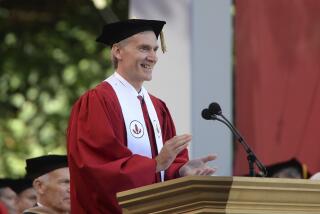Medical Schools Differ on Handling of Research Fraud
- Share via
BOSTON — Despite growing concern over research fraud, about one-quarter of the nation’s medical schools and teaching hospitals have no procedures for dealing with allegations of fakery and say they do not plan to adopt them, a Harvard survey shows.
“To some extent, there is resistance on the part of the scientific community to taking this issue seriously,” said Penelope J. Greene, a sociologist and statistician at Harvard’s Kennedy School of Government.
‘Psychic Numbing’
Some institutions told her they would deal with problems on the spot if they arose, while others said they doubted fraud could happen at their schools.
“We have been tardy in setting up official mechanisms for handling this problem because of what might be called a form of psychic numbing,” one official told her. “It never occurred to us that it could happen to us.”
Others said they relied on the “self-correcting nature of research”--the idea that fraud will eventually be exposed by scientists attempting to duplicate the faked work.
Greene surveyed 493 medical schools, teaching hospitals, graduate schools and schools of public health. Twenty-four percent said they had written rules for dealing with questions of fraud, 25% had none at all and no intention of drawing up any, while the rest said they were formulating such procedures.
She outlined her findings in a presentation at the National Institutes of Health. They will be published this fall in the British journal Minerva.
Recent Fraud Cases
Several cases of research fraud at respected universities have been publicized in recent years. Often, they involve young researchers eager to win tenured faculty positions.
However, Greene said her survey turned up some incidents that have never been made public, including one case in which a full professor was quietly asked to leave after a fellow scientist blew the whistle.
“Basically, no one else in the institution knew about it,” she said. “This person resigned, and no one ever knew why.”
Those who responded to the survey were promised anonymity, and she did not identify the institution.
Question of Publicity
Whether or not to publicize fraud is one of many areas in which universities disagree in their handling of these cases. Some said that publicity would be a deterrent, while others worried that it might hurt the institution’s reputation.
There is even uncertainty about how to define outright fraud and distinguish it from negligence.
“Most scientists agree that fabrication, falsification and misrepresentation of data, along with plagiarism, should be regarded as fraud,” she reported, “but it remains a problem as to how errors stemming from careless record-keeping and conscious bias are to be treated.”
Her survey also found variations in the degree of freedom that accused scientists are given to respond to allegations. Only 44% of the institutions allowed for a hearing of any sort, and 35% had set up an appeals procedure. One specifically said that the accused could not be represented by a lawyer.
More to Read
Sign up for Essential California
The most important California stories and recommendations in your inbox every morning.
You may occasionally receive promotional content from the Los Angeles Times.










